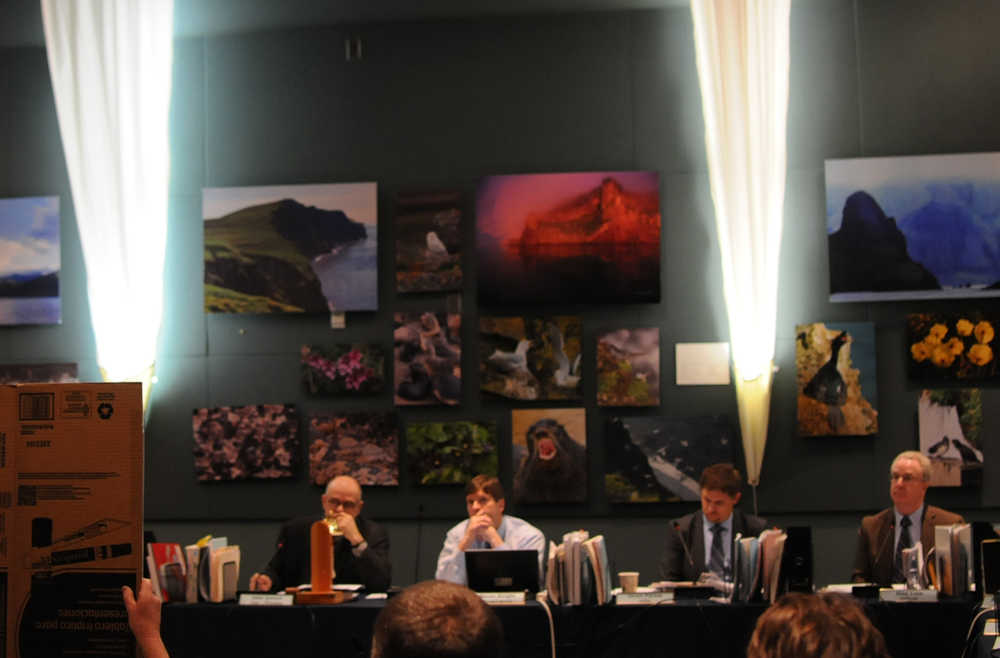Much of the conversation before the Board of Fisheries on Wednesday afternoon in Homer went back and forth on whether to liberalize the winter salt water king salmon fishery in Lower Cook Inlet.
The fishery, which occurs between Oct. 1 and March 31 each year from the Anchor Point Light southward in Cook Inlet, allows anglers to target immature king salmon in salt water, known as feeder kings, outside the regular season. Currently there is a bag limit of two fish per day, with no annual limit for fish less than 20 inches long.
A number of proposals submitted to the Board of Fisheries for its Lower Cook Inlet cycle asked the board to loosen some of the regulations on the fishery. At the first day of the four-day meeting Wednesday at the Islands and Oceans Visitor Center in Homer, members of the public packed the room all day to get a chance to speak for or against proposals before the board.
In the morning before the public comments began, Alaska Department of Fish and Game staff provided an update on a research project to gather genetic data on sport-caught king salmon in Lower Cook Inlet, establishing which stocks of fish are being caught in the marine fishery. The staff presented two years of data, which indicated that the vast majority of the stocks come from outside Cook Inlet during the winter.
Andrew Barclay, a geneticist in the Fish and Game Genetics Lab, warned in the presentation that the results so far should not be expanded outside the years of the study and that the samples could be slanted because anglers tend to fish in places where the fish are most concentrated, leading them to fish in particular places rather than randomly all over the area.
“(Another) factor in interpreting these results is that the stock composition you see in the harvest may not translate to the composition of stocks that are present in the Lower Cook Inlet management area during these fisheries,” he said. “Some fish may be more vulnerable due to their life history strategy, or whether they’re mature or immature fish.”
The study will continue for another year. The group that submitted nine proposals on the winter king fishery, a grassroots angler group called Cook Inlet Recreational Fishermen, submitted its proposals before the genetic project update was publicly available but it supports their requests to allow additional harvest, said Pete Zimmerman, a spokesman for the group, in his testimony to the board. The group amassed its own data using coded wire tags and came up with the same conclusion that Cook Inlet stocks do not go to Kachemak Bay in the winter.
If the fish being caught out of the salt water in the winter are not Cook Inlet stocks, there’s no reason not to open up the fishery to additional harvest, he said. He urged the board to consider the new genetic data.
“Please consider the science and the leave the politics to the politicians,” he said.
A dozen members of the group and sport anglers testified in favor of the liberalization. Most asked the board to consider the genetic research in the decisions.
Homer sponsors a winter king tournament in March, which attracts people from all over, said Homer Chamber of Commerce Executive Director Karen Zak in her testimony. In bad-weather years, 850 people may turn out, but in warmer years, as many as 1,300 have come. If the board sees fit to extend the dates of the season, as one of the proposals asks, then the chamber could consider moving the tournament to April, when weather is likely to be better and more light would make things safer for boats.
The town benefits economically from the fishery, she said.
“The chamber represents members who rely on the feeder king industry,” she said.
However, other commenters were opposed. One proposal asks that the board set a one fish per day, five fish per year limit on winter kings, and several spoke in favor of leaving the fishery as is with the regulations.
The Central Peninsula Fish and Game Advisory Committee, which covers the area between the Kenai and Soldotna area and Homer, opposed all the proposals to liberalize the winter king salmon fishery. Steve Vanek, the secretary of the advisory committee who testified for the committee at the Board of Fisheries meeting, said the board thought the harvest numbers were underestimated and the fishery has greatly exceeded the current guideline harvest limit, which is 3,000 fish, in the past. One of Fish and Game’s proposals includes a clause to remove the guideline harvest limit.
Even if the kings are not from Cook Inlet, anglers shouldn’t overfish it, he said.
“We don’t have the right to destroy someone else’s fishery,” he said.
One of the proposals would also expand the season to begin earlier in August. Joseph Person, a Ninilchik setnetter, said he found this “unacceptable” because there were still late-run king salmon migrating into the rivers at that time, and to expand the fishery would run the risk of interfering with them.
He also said he opposed the attitudes of some of the proposals’ supporters toward opening opportunity on the winter king fishery.
“I find the notion that just because the kings are from somewhere else that unlimited harvest is justified to be somewhat irresponsible and short-sighted,” he said. “I sure hope that people elsewhere would not treat our Cook Inlet kings the same way just because they don’t originate in their rivers.”
The Board of Fisheries will continue its meeting in Homer Thursday, taking up proposals related to issues in Lower Cook Inlet.
Reach Elizabeth Earl at elizabeth.earl@peninsulaclarion.com.


